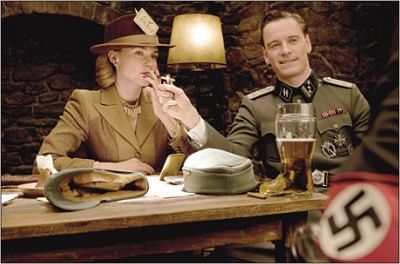Inglourious Basterds: Tarantino avengers in Nazi movieland

A scene from the film.
From the moment the charming, smiling, laughing Nazi in “Inglourious Basterds,” Quentin Tarantino's latest cinematic happening, sweeps onto the screen, he owns this film even more than its maker. Played by a little-known Austrian actor, Christoph Waltz, Col. Hans Landa is a vision of big-screen National Socialist villainy, from the smart cut of his SS coat to the soft gleam of his leather boots.
“Inglourious Basterds,” first shown at the Cannes Film Festival in May, is Tarantino's sixth feature. In many respects it looks and, as important, sounds like a typical Tarantino production with its showboating performances, encyclopedic movie references and streams of self-conscious dialogue. The whistling on the soundtrack comes straight from the Sergio Leone catalogue via the composer Ennio Morricone, and the American avenger, Lt. Aldo Raine (Brad Pitt), is a nod to the Hollywood actor Aldo Ray, a sandpaper-voiced 1950s Everyman who often seemed most at ease wearing Army fatigues, as he does in Anthony Mann's 1957 masterpiece “Men in War.”
Raine leads a pack of Jewish avengers, the inglourious basterds of the misspelled title, who occupy one part of the sprawling narrative and whose numbers include a bat-wielding American nicknamed the Bear Jew (the director Eli Roth, dreadful). Also elbowing for attention is a young French Jew, Shosanna Dreyfus (Mélanie Laurent), who's running a cinema in Paris under a pseudonym, and a German Army hero, Fredrick Zoller (Daniel Brühl), who dangerously woos her, unaware of her true identity. There's the British film critic turned spy, Lt. Archie Hicox (a very good Michael Fassbender), and the German movie star turned spy, Bridget von Hammersmark (Diane Kruger). Mostly, though, there is Landa, whose unctuous charm, impeccably modulated by Waltz, gives this unwieldy, dragging movie a much-needed periodic jolt.
Tarantino likes to take his sweet time -- he can be a master of the slow windup -- but rarely has one of his movies felt as interminable as this one and its 2 hours 32 minutes. The film is divided into five chapters organised around specific bits of business and conversations that increasingly converge. The second introduces the basterds while the third brings Shosanna together with her German suitor, who introduces her to Joseph Goebbels (Sylvester Groth). Landa swans in, and a ludicrous plot to kill Hitler is unveiled. The fourth chapter throws in an unrecognisable Rod Taylor as Winston Churchill, a barely recognizable Mike Myers as a British commander and a risible fiction: a suave film critic (Fassbender).
Set against a sweeping stretch of green French countryside in 1941, it opens with a dairy farmer, Perrier LaPadite (Denis Menochet), chopping wood. As his axe looms ominously in the foreground of the shot, he readies himself for some unwelcome German visitors. Colonel Landa, nicknamed the Jew Hunter, has come looking for hidden prey, a task for which he is, as he explains in a long verbal jag, eminently suitable.
Landa has already guessed there are Jews hiding. Tarantino reveals them in their hiding place, the camera slipping through the floor to show the terrified family members prostrate, their hands over their mouths and eyes wide in fear.
Too often in “Inglourious Basterds” the filmmaking falls short. Tarantino is a great writer and director of individual scenes, though he can have trouble putting those together, a difficulty that has sometimes been obscured by the clever temporal kinks in his earlier work.
Leading with his chin, Brad Pitt gets off some funny lines, particularly when he is pulling his Southern-flavoured vowels out like chewed gum, but the character is too broadly drawn to carry weight.
Cartoon Nazis are not new to the movies, and neither are fascinating fascists, as evidenced by Ralph Fiennes's Oscar-nominated turn in “Schindler's List.” Unlike those in “Schindler's List,” Tarantino's Nazis exist in an insistently fictional cinematic space where heroes and villains converge amid a welter of movie allusions.
Compiled by Cultural Correspondent

 For all latest news, follow The Daily Star's Google News channel.
For all latest news, follow The Daily Star's Google News channel. 



Comments